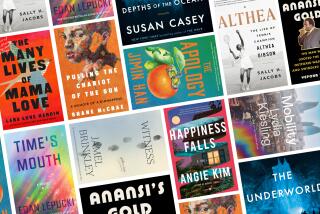Book review: ‘A King of Infinite Space’ by Tyler Dilts
A King of Infinite Space
A Novel
Tyler Dilts
AmazonEncore: 262 pp., $14.95 paper
Tyler Dilts doesn’t waste any time establishing the intentions of his debut mystery, “A King of Infinite Space.” First, there’s that title, drawn from “Hamlet”: “O God, I could be bounded in a nutshell and count myself a king of infinite space, were it not that I have bad dreams.”
Then, there’s his narrator, a Long Beach police detective named Danny Beckett, as steeped in the absurdities of existence as the playwright for whom, presumably, he is named. “I can’t go on, I’ll go on,” Samuel Beckett wrote, in a line Dilts could have used as an epigraph.
What is murder, after all, but the expression of a capricious universe, in which bad things happen to good people and a cop like Danny is left to sort out the mess? This is the question at the center of Dilts’ vivid novel, which is a police procedural with an existential edge.
Revolving around the brutal killing of Beth Williams, a high school English teacher, “A King of Infinite Space” takes its time developing, moving between the investigation and the tattered fragments of Danny’s life. In his 30s, a bit too fond of Grey Goose vodka, he is lonely, widowed after his wife, Megan, died in a car crash on Interstate 5.
For him, the danger of the case is that it offers too many points of identification, from the books on Beth’s shelves that he’d studied in college (“A Tale of Two Cities,” “Heart of Darkness,” “Moby-Dick,” “Huckleberry Finn”) to the odd coincidence that, years before, she had attended his wedding as the date of a friend.
“The last thing you want to do while standing over a victim’s body is to imagine them alive,” Danny explains. “It may sound cold, but they need to be objectified, viewed as a thing, simply a piece of meat, nothing more than an object to be studied for evidence.… Once you begin to imagine glowing green eyes and chestnut hair flowing in the wind … you start missing the little things — and it’s the little things that make the story.”
This is a classic noir conceit, the detective with a personal stake, and as “A King of Infinite Space” progresses, Dilts exposes Danny’s history in the evidence he pursues.
To get close to a potential suspect — also a widower — Danny uses his tragedy as a lever: “We spent almost an hour there in his office,” he reflects, “and by the time we finished, Daryl probably thought we were pals. Later, I would wonder what was worse — that I had exploited Megan’s memory in such a way, or that it had worked so well.”
Investigating Beth’s students, he uses his wife’s copy of “The Complete Works of William Shakespeare” to cross-reference a paper by a kid named Jorge Hernandez, who writes, “So I could totally sympathize with Hamlet and how he had that heavy-duty kind of angst because I know what that’s like because of when my brother Hector got shot and died all I wanted to do was bust somebody’s head just like Hamlet.”
On the one hand, that’s a throwaway, since Jorge is not the killer; it has nothing to do with the resolution of the plot. Yet it allows Dilts to make a connection among Hamlet, Jorge and Danny, none of whom can escape bad dreams.
“Once in a great while,” Dilts writes, “in a small bar a block or two from a police station, an hour or so after last call, with empty beer bottles and shot glasses in front of him, a cop will speak in a quiet voice, almost as if embarrassed, of his dreams.… We don’t speak of these dreams out of any particular need for understanding or to vent our emotions. We do it simply so that when those long nights come, and we lie awake in the darkness, we’ll know that we’re not alone.”
This, it could be argued, is the point of art, of literature, to bridge the silence that divides us. Noir, though, comes with a different agenda: to see through such sentimental attachments and bring us face-to-face with the empty darkness of the world.
From that perspective, the best we can hope for is a brief reprieve, a temporary adjustment, an instant to catch our breath. “I thought about Megan and about Beth,” Danny observes at the end of the novel, “and wondered what, if anything, I had put to rest. Had I found my reckoning?” The answer is uncertain, but for the moment anyway, he has stilled his dreams.
“A King of Infinite Space” is not without its problems. Dilts occasionally telegraphs the action, and at times — most glaringly in the denouement, which explodes in a predictable act of violence — he relies too heavily on the conventions of the genre.
But these are quibbles with a book that not only offers a compelling story but also gets at the abiding human drama underneath. Danny may not be Hamlet, nor, for that matter, the other Beckett, but through him, Dilts evokes the nobility of a man adrift in the middle of his own life. This, to a greater or lesser extent, describes all of us, and it is in the details of Danny’s struggle, those “little things that make the story,” that “A King of Infinite Space” resonates.
david.ulin@latimes.com



